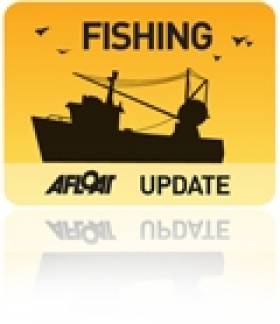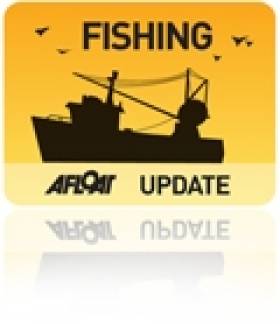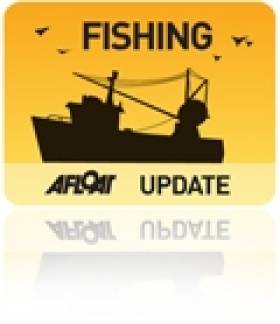Displaying items by tag: fish discards
Fish Discards Should End 'Within Six Years' Says Coveney
#CFP - The deal reached between EU fisheries ministers this morning on reform of the Common Fisheries Policy (CFP) should bring an end to the practice of fish discards within the next six years, according to Ireland's Marine Minister.
As reported earlier today on Afloat.ie, Minister Simon Coveney emerged from 36 hours of talks in Brussels confident that a far-reaching reform on fisheries policy had been reached.
RTÉ News reports that the compromise deal will see a 93% ban on discards take immediate effect, phasing towards a full ban by 2019, with special allowances made in certain cases where sustainability of fish stocks allows.
Minister Coveney, as president of the EU Council of Fisheries Ministers during Ireland's EU presidency, will submit the agreed reforms to the European Parliament - which has previously been steadfast in its demands for a complete ban on fish discards to halt the depletion of fish stocks in European waters.
As previously reported on Afloat.ie, this week's discussions on fisheries reform in Brussels have been described as a "once-in-a-decade opportunity" to end the wasteful practice of fish discards, which has seen as much as 50% of the catch in the North Sea is thrown back overboard dead.
#CFP - 'Fight Fight' campaigner Hugh Fearnley-Whittingstall writes on the Guardian's Comment Is Free blog that this week's upcoming discussions among the EU's fisheries ministers is a "once-in-a-decade opportunity" to end the practice of fish discards.
The TV chef, who has long campaigned against the practice of discarding fish in Europe's seas under the quota system implemented by the Common Fisheries Policy (CFP), hopes that this week's discussions among EU ministers over the final text to submit to the European Parliament includes "a proper discard ban - one that will finally eliminate the disgraceful waste of fish that occurs under the current system".
Though all parties involved have agreed in principle to ban discards, Fearnley-Whittingstall believes "we're in the endgame: a tussle between the parliament and the ministers over the final shape of the new CFP" - with "powerful fishing countries such as France and Spain happier to see the current broken system continue, rather than deal with the awkward aspects of transforming their fisheries into a sustainable, profitable and growing sector".
As previously reported on Afloat.ie, Ireland's Marine Minister Simon Coveney - president of the EU Council of Fisheries Ministers - is pushing for ministers to focus on the most critical elements such as fish discards in their discussions on CFP reform in Brussels from tomorrow 13 May.
Ending Fish Discards Requires New Technologies - Damanaki
#Fishing - Key to proposals to end fish discards in this year's reform of the Common Fisheries Policy (CFP) is the introduction of new technology like wheelhouse cameras and 'smart nets'.
So argues EU Fisheries Commissioner Maria Damanaki, as BBC News reports on trials of new net designs that can separate fish catches and reduce damage to the seabed.
One of the fishing net innovations involves a bendable plastic grid attached to the middle of a trawl net that allows smaller fish and juveniles to pass through while snaring the valuable larger catch.
Another design, the Rollerball net, attempts to eliminate the problem of heavy trawling gear churning up debris on the sea floor while reducing drag and saving on boats' fuel bills.
Assuaging concerns over the prohibitive costs for fishermen, Damanaki says she hopes that such 'smart nets' will be subsidised by as much as 85% - while emphasising that the adoption of new technology could mean the difference between being allowed to fish or being banned from the ocean.
Wheelhouse CCTV cameras are another method that has been shown to reduce discards to less than 1% in some cases - and Damanaki says they will be essential if the CFP reforms indeed include a zero tolerance policy on fish discards.
BBC News has much more on the story HERE.
#FISHING - 'Fish fight' campaigners have cautiously welcomed the EU Council's agreement to end the practice of fish discards, following marathon talks in Brussels.
BBC News reports on what Europe's fisheries ministers are calling a "breakthrough" deal, but one that environmentalists say is too much of a compromise for Europe's oceans.
Provisional dates are already been drawn up to see a ban on discards of mackerel and herring within two years, with a phased ban on discards of cod, haddock, plaice and sole given till 2018 for implementation due to the difficulties in avoiding accidental catch of those species.
Ministers also suggested that different regions of the EU should have more individual control over fisheries policy, and have given themselves till 2020 to end overfishing in European waters.
But Greenpeace and other environmental groups have criticised this timeline, as well as the "vague" wording of proposed limits on fishermen.
"There is a real risk that fish and fishermen are facing another 10 years of overfishing and stock decline, with real consequences for species like cod, hake and tuna," said Greenpeace's Willie Mackenzie.
The compromise deal comes some weeks after Afloat.ie reported plans by an alliance of EU member states to prevent the discards ban.
At present, half of all fish in the North Sea - and up to two-thirds in other areas - are thrown back under the quota system implemented under the EU's common fisheries policy. The practice was recently highlighted by TV chef Hugh Fearnley-Whittingstall's 'Fish Fight' campaign.
The new agreement is still subject to more talks, and must also be passed by the EU Parliament and Commission.
Make or Break Time for Fish Discards Ban
#FISHING - The Guardian reports that an alliance of EU member states plans to "hijack" a council meeting of the union's fisheries ministers today to prevent a ban on fish discards.
EU maritime affairs commissioner Maria Damanaki has stated her commitment to ending the practice, describing it as “unethical, a waste of natural resources and a waste of fishermen’s effort.”
Half of all fish in the North Sea - and up to two-thirds in other areas - are thrown back under the quota system implemented under the EU's common fisheries policy. The practice was recently highlighted by TV chef Hugh Fearnley-Whittingstall's 'Fish Fight' campaign.
Minister for the Marine Simon Coveney has called on EU states to support Ireland's effort to deal with fish discards, as previously reported on Afloat.ie.
But some member states, led by France and Spain, have dismissed the proposed ban as "unrealistic" and "too prescriptive", and will attempt to pass a declaration to allow the practice to continue indefinitely.
According to the Guardian, the charge is being led by industrial-scale fishing enterprises who want to retain the permission to discard lower value fish in order to maximise profits.
Brussels insiders say that if the declaration were to pass it would "kill the reform".

































































